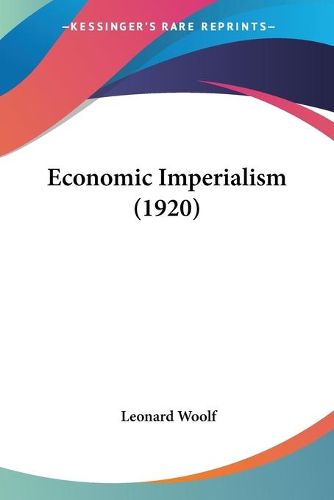Readings Newsletter
Become a Readings Member to make your shopping experience even easier.
Sign in or sign up for free!
You’re not far away from qualifying for FREE standard shipping within Australia
You’ve qualified for FREE standard shipping within Australia
The cart is loading…






Economic Imperialism is a book written by Leonard Woolf in 1920. The book explores the economic and political implications of imperialism, particularly in the context of the British Empire. Woolf argues that imperialism is driven by economic interests, and that the exploitation of colonies and their resources is a key aspect of imperialist policies. He also examines the impact of imperialism on the colonized peoples, arguing that it leads to oppression, poverty, and social inequality. Woolf's analysis is based on his own experiences as a colonial administrator in Sri Lanka, as well as extensive research into the history of imperialism. The book is considered a seminal work in the field of political economy and remains relevant today in discussions about globalization, inequality, and the legacy of colonialism.This scarce antiquarian book is a facsimile reprint of the old original and may contain some imperfections such as library marks and notations. Because we believe this work is culturally important, we have made it available as part of our commitment for protecting, preserving, and promoting the world's literature in affordable, high quality, modern editions, that are true to their original work.
$9.00 standard shipping within Australia
FREE standard shipping within Australia for orders over $100.00
Express & International shipping calculated at checkout
Economic Imperialism is a book written by Leonard Woolf in 1920. The book explores the economic and political implications of imperialism, particularly in the context of the British Empire. Woolf argues that imperialism is driven by economic interests, and that the exploitation of colonies and their resources is a key aspect of imperialist policies. He also examines the impact of imperialism on the colonized peoples, arguing that it leads to oppression, poverty, and social inequality. Woolf's analysis is based on his own experiences as a colonial administrator in Sri Lanka, as well as extensive research into the history of imperialism. The book is considered a seminal work in the field of political economy and remains relevant today in discussions about globalization, inequality, and the legacy of colonialism.This scarce antiquarian book is a facsimile reprint of the old original and may contain some imperfections such as library marks and notations. Because we believe this work is culturally important, we have made it available as part of our commitment for protecting, preserving, and promoting the world's literature in affordable, high quality, modern editions, that are true to their original work.